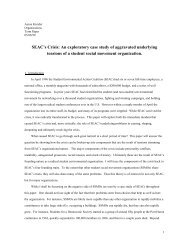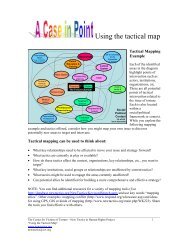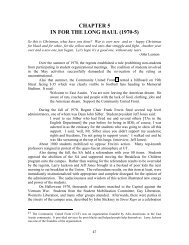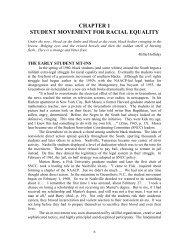A Gendered Organizational Analysis of the ... - Campus Activism
A Gendered Organizational Analysis of the ... - Campus Activism
A Gendered Organizational Analysis of the ... - Campus Activism
Create successful ePaper yourself
Turn your PDF publications into a flip-book with our unique Google optimized e-Paper software.
since this person has traditionally been male (1990, 150). She blames bureaucratic structures and <strong>the</strong>ir extensive<br />
rules or texts for being responsible for <strong>the</strong> false gender neutralization <strong>of</strong> organizations (1992, 256).<br />
Not only are jobs gendered, but systems <strong>of</strong> job evaluation are biased against women since <strong>the</strong>y reinforce<br />
pre-existing inequalities by privileging traditionally male skills and male dominated positions over those <strong>of</strong><br />
women (1990, 149-150). For instance a task that a (male) boss does is skilled, but if that task is done by a<br />
(female) secretary <strong>the</strong>n it might become unskilled (1990, 149). When managers ‘rationalize’ <strong>the</strong> job evaluation<br />
system, <strong>the</strong>y did/do it so as to justify pre-existing inequalities that came from a past history <strong>of</strong> organizational and<br />
societal sex stratification (1990, 150).<br />
Acker argues that gendered male organizations, by separating private work (like housework) from<br />
public work, promote private pr<strong>of</strong>it over <strong>the</strong> public good (1992, 258). In <strong>the</strong> short term she favors a reformist<br />
strategy, supporting efforts like comparable worth activism (1992, 259), while in <strong>the</strong> long run she supports a<br />
socialist utopia that would end <strong>the</strong> public/private distinction and value all work more equally (1990, 155). She<br />
summarizes her goal and that <strong>of</strong> o<strong>the</strong>rs:<br />
Feminist research and <strong>the</strong>orizing, by continuing to puzzle out how gender provides <strong>the</strong> subtext<br />
for arrangements <strong>of</strong> subordination, can make some contributions to a future in which collective<br />
action to do what needs doing – producing goods, caring for people, disposing <strong>of</strong> <strong>the</strong> garbage –<br />
is organized so that dominance, control, and subordination, particularly <strong>the</strong> subordination <strong>of</strong><br />
women, are eradicated, or at least minimized, in our organizational life (1990, 155).<br />
Several people have applied Acker’s <strong>the</strong>ory and gendered processes to different organizations, though<br />
<strong>the</strong>y chose relatively ‘easy’ cases in which one would expect her <strong>the</strong>ory to apply due to historical and current sex<br />
segregation in <strong>the</strong> jobs <strong>of</strong> <strong>the</strong>se organizations. Manville (1997) examined an Australian Anglican parish and<br />
found it to be sex segregated. For instance 62% <strong>of</strong> <strong>the</strong> members were women, but only 40% <strong>of</strong> administrators.<br />
And <strong>of</strong> <strong>the</strong> women administrators, nine <strong>of</strong> <strong>the</strong> twelve (75%) worked outside <strong>the</strong> home (whereas only 43% <strong>of</strong><br />
women in general did) and thus were more ‘masculine’. Small groups, used to build fellowship and community<br />
among church members, were primarily unisex. The weekly tasks that kept <strong>the</strong> parish running were also sex<br />
segregated. And not only did women prepare <strong>the</strong> food, flowers, do <strong>the</strong> laundry, and teach Sunday school, but<br />
<strong>the</strong>y also internalized <strong>the</strong> segregation and wanted to do <strong>the</strong>se tasks. Compared to <strong>the</strong> parish, SEAC’s leadership<br />
4
















![Meaningful Student Involvement Research Guide [pdf] - SoundOut](https://img.yumpu.com/38822556/1/190x231/meaningful-student-involvement-research-guide-pdf-soundout.jpg?quality=85)